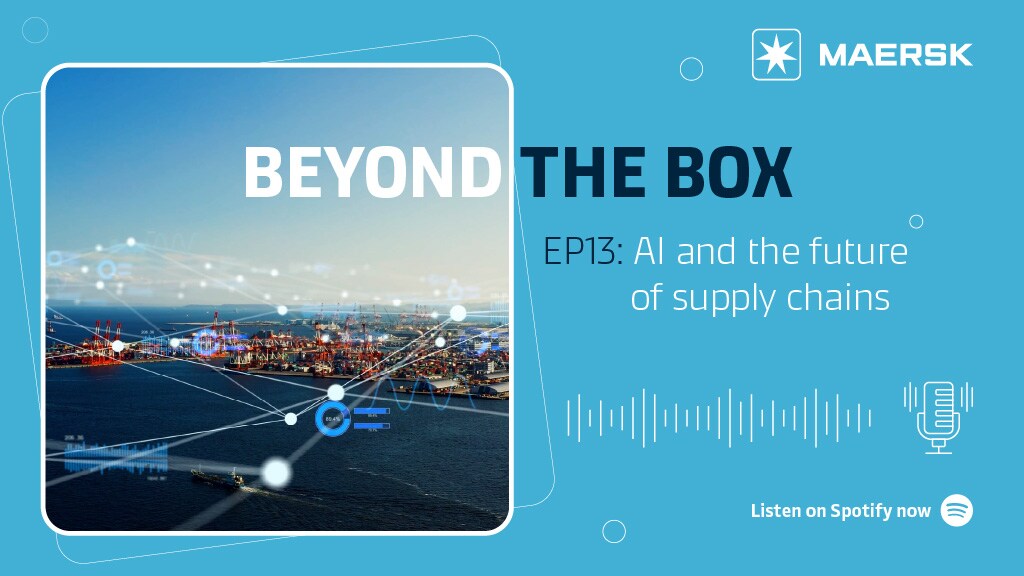Artificial intelligence (AI) has become a transformative force in many industries, including in logistics and supply chain management. AI’s has huge potential in these fields. This ranges from its ability to unlock new workflows, accelerate processes, and handle vast amounts of data.
This article is based on the latest episode of the Beyond the Box podcast. It explains what AI could mean for supply chains and logistics. What are AI’s capabilities? Where are the limitations? And how could it capitalise on human expertise?
The predictive power of artificial intelligence in supply chains and logistics
One of the strengths of AI for supply chain management is its predictive capability. AI excels at making predictions based on large datasets. This is crucial for optimising various aspects of the supply chain. As Peter Swartz, Co-Founder and Chief Science Officer of Altana AI, told the podcast: AI's strength lies in processing vast amounts of data. This can lead to deeper understanding and recommended actions, thus simplifying complex tasks.
However, the predictive power of artificial intelligence is not without limitations. Yossi Sheffi, Director of MIT’s Centre for Transporation and Logistics, says AI needs extensive datasets to make accurate predictions. It struggles with rare or unprecedented events. These don't have enough data or examples for the algorithms to learn from.
“Let’s take the pandemic for example,” he says. “AI needs an immense amount of training data. How many pandemics have we had? One, two, three four? It’s not millions and AI needs a very large number”.
Despite these challenges, AI can still play a key role in predicting and managing frequent disruptions in supply chains. This could include supplier delays or transportation bottlenecks.
Efficiency and new capabilities for supply chain AI
AI's potential impact on supply chains and logistics goes beyond predictions. It can significantly boost efficiency and unlock new capabilities in global trade. AI systems can provide a comprehensive view of the global trade network. This holistic perspective allows businesses to focus on the most critical elements of their supply chains. It leads to substantial efficiency gains.
“AI gives us the ability to understand and act upon very complex systems. It can offer a comprehensive view of the world that can involve hundreds of millions of companies, billions of shipments. We can then focus on the most important parts of that. And what we see is both efficiency gains on existing processes of 30 to 50%. In some cases, they can be 10 times faster,” says Peter Swartz.
AI also enables the creation of new capacities in global trade management. It can integrate siloed data and systems to create a unified operating picture. This enhances decision-making and collaboration across different tiers of the supply chain. Integration also facilitates the proactive identification and resolution of potential issues. The overall result is improved resilience and efficiency for global trade networks.
Real-world applications for AI in supply chains
The practical applications of AI in supply chains and logistics are diverse. For instance, AI-driven digital twins and predictive modeling are already revolutionising port operations. Krishnan Srinivasan, Chief Data Officer at Maersk, says digital twins allow port operators to simulate various scenarios. This can include congestion or strikes. They can then optimize their responses in real-time. This significantly reduces the time required for planning and enhances operational efficiency.
“A few years back, when a ship had to arrive at a port, the port operator would spend a lot of time getting ready for the ship to berth,” Krishnan Srinivasan says. “This requires a lot of complex spreadsheets and permutations. It used to get cumbersome very quickly. Having a human manually run through this permutation combination was pretty arduous. Then we looked at AI, and today we do it with a digital twin. We have all these inputs from our terminals, from different sensors and data. And we have actually created a complete digital twin of the whole terminal. This provides us with the capability to do ‘what if’ scenarios - much ahead of time. What used to take days takes hours.”
AI is also pivotal in providing end-to-end visibility for customers. With AI-powered systems, businesses can track shipments in real-time. They can anticipate potential disruptions and take proactive measures to mitigate them. This transparency improves customer satisfaction and enhances overall supply chain reliability.

The human connection
AI has brought significant advancements. Nonetheless, the role of humans remains crucial in supply chain management. AI systems are powerful tools that assist humans rather than replace them.
Yossi Sheffi emphasises that humans excel at identifying structural changes. They can also make decisions based on incomplete or unforeseen data. These are tasks that AI still struggles with.
Successfully implementing AI also requires human oversight to ensure accuracy and reliability. Krishnan Srinivasan mentions the importance of having a "human in the loop" to verify AI-generated data and ensure it aligns with real-world conditions.
“We are right now making sure that humans are complementary to the technology. We have people to, at least in early stages, verify the data before we share it broadly. We really make sure that when an answer is provided, it can relate back and tie back to the source. That's very, very important versus AI trying to just come up with an answer,” Krishnan Srinivasan says.
This synergy between humans and AI ensures that the technology enhances human decision-making. It also helps ensure accuracy alignment with ethical standards.
The future of AI in supply chains and logistics
Going forward, the integration of AI in logistics and supply chains will continue to evolve. As AI technologies become more sophisticated, their ability to handle complex systems will improve. This will lead to potentially even greater efficiencies and new capabilities. However, the human role will continue to be essential in providing the intuition and ethical considerations that AI cannot replicate.
AI is transforming the logistics and supply chain industry. It is enhancing efficiency, providing new capabilities, and offering unprecedented visibility and predictive power. AI has its limitations, particularly in handling rare or unforeseen events. However, its benefits in managing frequent disruptions and optimising operations are important. AI, supported by human expertise, promises a future where supply chains are more resilient and efficient.
Sign up to The Logistics Pulse newsletter
You did it, welcome onboard!
We're sorry, but there was a problem sending your contact request.
Please review the form fields and ensure all required information is provided correctly. If the issue persists, please contact our support team for further assistance.
Sign up to The Logistics Pulse newsletter
Receive our insights directly in your mailbox by signing up through this form and enter a world of truly integrated logistics. Get inspired by our selection of articles that help you navigate supply chains, understand industry trends, and shape your logistics strategy. You can unsubscribe anytime.
I agree to receive logistics related news and marketing updates by email, phone, messaging services (e.g. WhatsApp) and other digital platforms, including but not limited to social media (e.g., LinkedIn) from A. P. Moller-Maersk and its affiliated companies (see latest company overview). I understand that I can opt out of such Maersk communications at any time by clicking the unsubscribe link. To see how we use your personal data, please read our Privacy Notification.
By completing this form, you confirm that you agree to the use of your personal data by Maersk as described in our Privacy Notification.














